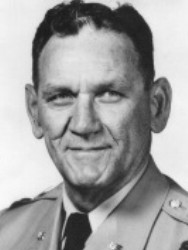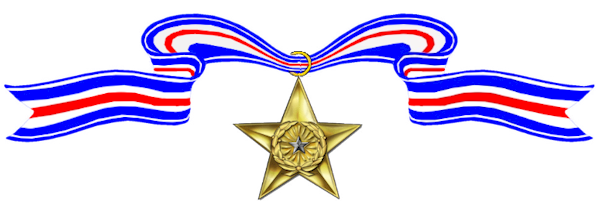Bobbie Brown, recipient of the Medal of Honor, two Silver Stars, and was wounded 13 times in World War II. He was employed as a janitor at the U.S. Military Academy at West Point following his war service.

–
Cemetery:
Awards Received
-

Silver Star
-

Silver Star
-

Medal of Honor
-
Silver Star
Service:
United States ArmyRank:
First Lieutenant (Infantry)Batallion:
1st BattalionRegiment:
18th Infantry RegimentDivision:
1st Infantry DivisionAction Date:
World War II
Headquarters, 1st Infantry Division, General Orders No. 47 (September 17, 1943)The President of the United States of America, authorized by Act of Congress July 9, 1918, takes pleasure in presenting the Silver Star to First Lieutenant (Infantry) Bobbie Evan Brown, Jr. (ASN: 0-2053899), United States Army, for gallantry in action while serving with Company B, 1st Battalion, 18th Infantry Regiment, 1st Infantry Division, in action against the enemy in North Africa and Sicily, during the period from April through August 943. While under heavy enemy mortar and small arms fire, Lieutenant Brown skillfully led his platoon against a strong enemy force and, although outnumbered, caused them to withdraw. His gallant actions and dedicated devotion to duty, without regard for his own life, were in keeping with the highest traditions of military service and reflect great credit upon himself and the United States Army.
-
Silver Star
Service:
United States ArmyRank:
First Lieutenant (Infantry)Batallion:
1st BattalionRegiment:
18th Infantry RegimentDivision:
1st Infantry DivisionAction Date:
June 9, 1944
Headquarters, 1st Infantry Division, General Orders No. 33 (July 10, 1944)The President of the United States of America, authorized by Act of Congress July 9, 1918, takes pleasure in presenting a Bronze Oak Leaf Cluster in lieu of a Second Award of the Silver Star to First Lieutenant (Infantry) Bobbie Evan Brown, Jr. (ASN: 0-2053899), United States Army, for gallantry in action while serving with Company B, 1st Battalion, 18th Infantry Regiment, 1st Infantry Division, in action against the enemy in Normandy, France, on 9 June 1944. His gallant actions and dedicated devotion to duty, without regard for his own life, were in keeping with the highest traditions of military service and reflect great credit upon himself and the United States Army.
-
Medal of Honor
Service:
United States ArmyRank:
Captain (Infantry)Batallion:
1st BattalionRegiment:
18th Infantry RegimentDivision:
1st Infantry DivisionAction Date:
October 8, 1944
War Department, General Orders No. 74 (September 1, 1945)The President of the United States of America, in the name of Congress, takes pleasure in presenting the Medal of Honor to Captain (Infantry) Bobbie Evan Brown, Jr., United States Army, for conspicuous gallantry and intrepidity in action above and beyond the call of duty. Captain Brown commanded Company C, 1st Battalion, 18th Infantry Regiment, 1st Infantry Division, on 8 October 1944, when it, with the Ranger Platoon of the 1st Battalion, attacked Crucifix Hill, a key point in the enemy’s defense of Aachen, Germany. As the leading rifle platoon assaulted the first of many pillboxes studding the rising ground, heavy fire from a flanking emplacement raked it. An intense artillery barrage fell on the American troops which had been pinned down in an exposed position. Seeing that the pillboxes must be neutralized to prevent the slaughter of his men, Captain Brown obtained a pole charge and started forward alone toward the first pillbox, about 100 yards away. Hugging the ground while enemy bullets whipped around him, he crawled and then ran toward the aperture of the fortification, rammed his explosive inside and jumped back as the pillbox and its occupants were blown up. He rejoined the assault platoon, secured another pole charge, and led the way toward the next pillbox under continuous artillery mortar, automatic, and small-arms fire. He again ran forward and placed his charge in the enemy fortification, knocking it out. He then found that fire from a third pillbox was pinning down his company; so he returned to his men, secured another charge, and began to creep and crawl toward the hostile emplacement. With heroic bravery he disregarded opposing fire and worked ahead in the face of bullets streaming from the pillbox. Finally reaching his objective, he stood up and inserted his explosive, silencing the enemy. He was wounded by a mortar shell but refused medical attention and, despite heavy hostile fire, moved swiftly among his troops exhorting and instructing them in subduing powerful opposition. Later, realizing the need for information of enemy activity beyond the hill, Captain Brown went out alone to reconnoiter. He observed possible routes of enemy approach and several times deliberately drew enemy fire to locate gun emplacements. Twice more, on this self-imposed mission, he was wounded; but he succeeded in securing information which led to the destruction of several enemy guns and enabled his company to throw back two powerful counterattacks with heavy losses. Only when Company C’s position was completely secure did he permit treatment of his three wounds. By his indomitable courage, fearless leadership, and outstanding skill as a soldier, Captain Brown contributed in great measure to the taking of Crucifix Hill, a vital link in the American line encircling Aachen.

